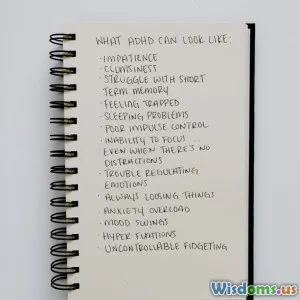
Are You Overthinking or Just Being Thorough Understanding the Signs
7 min read Discover how to differentiate overthinking from thoughtful thoroughness and improve your mental clarity. (0 Reviews)
Are You Overthinking or Just Being Thorough? Understanding the Signs
In today’s fast-paced world, our minds are constantly juggling information, decisions, and emotions. But how do you know when you’re thoughtfully thorough or simply caught in a spiral of overthinking? This subtle distinction can influence your mental health, productivity, and relationships. Understanding the signs that differentiate productive thought from anxious rumination is crucial for personal and professional growth.
The Psychology Behind Overthinking and Thoroughness
Overthinking generally involves repetitive, negative, or circular thought patterns without arriving at practical solutions. It’s often associated with anxiety, indecisiveness, and mental fatigue. On the other hand, thoroughness refers to deliberately and carefully analyzing information or situations with the goal of making informed decisions or solving problems with clarity.
Psychologist Susan Nolen-Hoeksema’s research highlights that overthinking leads to emotional distress because it focuses on problems rather than solutions, whereas thorough thinking is goal-oriented and constructive.
Signs You Are Overthinking
1. Analysis Paralysis
You find yourself caught in a loop of re-evaluating choices without making progress. For example, repeatedly checking pros and cons for hours without moving forward on decisions like accepting a job offer or making a purchase.
2. Emotional Distress and Anxiety
Overthinkers often experience heightened anxiety. Your heart races, and negative ‘what if’ scenarios dominate your mind, draining emotional energy with no clear resolution.
3. Difficulty Sleeping and Concentration
Rumination can invade your rest time, making falling asleep or concentrating during the day challenging. Studies show chronic overthinking can disrupt both sleep quality and cognitive performance.
4. Obsessing Over Past Mistakes or Future Outcomes
If you constantly replay past events or worry excessively about uncertain futures, you might be overthinking. This fixation rarely produces actionable insights and often increases regret or fear.
Signs You Are Being Thorough
1. Purposeful and Structured Thinking
When you’re thorough, your thought process has a clear goal: to solve a problem or evaluate options pragmatically. For example, you may list specific factors when budgeting or researching a major decision.
2. Balanced Emotional Response
Thorough thinkers acknowledge both positives and negatives objectively without emotional overwhelm. This balance helps maintain clarity and reduces reactionary decisions.
3. Action-Oriented Outcomes
Thoroughness leads to deciding and acting based on well-assessed information. Unlike overthinkers, thorough individuals achieve closure by moving forward after adequate evaluation.
4. Ability to Set Boundaries on Thinking
You take breaks or limit your consideration time on complex issues. This self-regulation prevents mental exhaustion and enables more productive reflection later.
Real-World Examples
Example 1: Career Decisions Overthinkers may delay applying for jobs indefinitely due to fear of making the wrong choice, worrying about an unpredictable future. Thorough thinkers research companies, assess their goals, and prepare applications within a realistic timeframe.
Example 2: Relationships In personal relationships, overthinking can lead to reading too much into messages, causing unnecessary conflicts. Being thorough implies seeking clarity through open communication and evaluating feelings deliberately.
Expert Tips to Shift from Overthinking to Thoroughness
Practice Mindfulness
Mindfulness encourages staying present and observing thoughts without judgment. It’s shown to reduce anxious rumination by refocusing attention away from cyclical worries.
Set Time Limits for Decision-Making
Use techniques like the Pomodoro Technique (25-minute focused sessions) to limit how long you dwell on a problem. This improves efficiency and stops endless deliberation.
Journaling Your Thoughts
Writing down worries can externalize and clarify your thought patterns. You’ll more easily spot when concern turns unproductive and return to objective analysis.
Seek Feedback
Talking with trusted friends or mentors can offer perspective. Sometimes an external viewpoint uncovers whether your concerns are realistic or magnified.
Cognitive Behavioral Techniques
Challenging catastrophic thinking and replacing “what if” scenarios with evidence-based assessments help recalibrate mental patterns toward thorough reflection.
Why Balancing Thought Matters
Overthinking can lead to chronic stress, poor decision-making, and paralysis by analysis, which undermines both mental health and life satisfaction. Conversely, an overly hurried approach without sufficient thought risks mistakes and regret.
Balanced thoroughness equips you with clarity, resilience, and confidence to tackle challenges, optimize decisions, and maintain psychological well-being. It nurtures prudent skepticism without emotional overwhelm.
Conclusion
Distinguishing overthinking from being thorough is vital in fostering mental clarity and effective decision-making. By recognizing the signs—such as emotional distress, circular thoughts, or goal-oriented analysis—you empower yourself to shift toward productive thinking. Incorporating mindfulness, time management, and cognitive tools can break the cycle of overthinking and enhance thoughtful thoroughness.
Embrace this balance, and you’ll find that careful discretion need not come at the cost of peace of mind. Instead, it can become the foundation for confident living and meaningful growth.
Takeaway: Next time your mind starts spiraling, consider if you’re searching for solutions or trapped in anxiety. This awareness is the first step toward mastering your mental landscape.
Rate the Post
User Reviews
Popular Posts





















